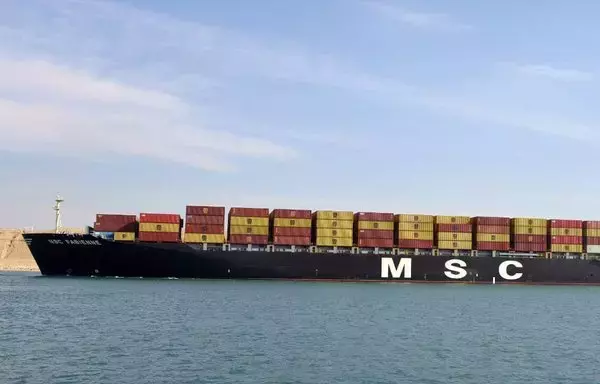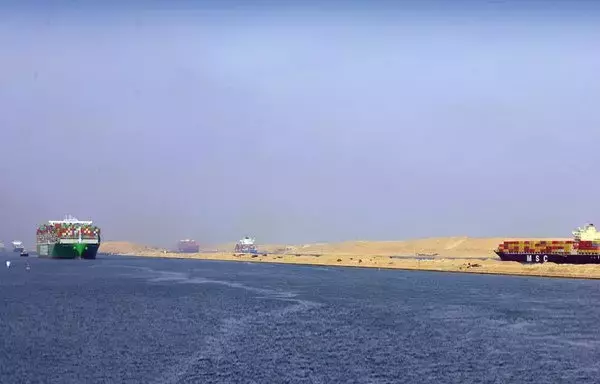Economy
Houthis' Red Sea threats add to Egypt's economic woes
Shipping traffic in the Suez Canal, a key source of revenue for Egypt, has been affected by the Houthis' threats and attacks in the Red Sea.

By Jana al-Masri |
CAIRO -- The Houthis' threats to navigation in the Red Sea will have a direct negative impact on Egypt's economy, which is still struggling to recover from the pandemic and the fallout from Russia's invasion of Ukraine, experts said.
Shipping traffic in the Suez Canal, a key source of revenue for Egypt, has been affected by the Iran-backed group's threats and attacks in the Red Sea, which this week forced a number of major shipping firms to reroute their vessels.
Merchant vessels are being forced to take the longer route around the Cape of Good Hope "out of fear of the Houthis' threats," Ain Shams University economics professor Shaher Abdullah told Al-Fassel.
"Although the number of rerouted journeys has so far been limited, it is expected to rise if the security threats persist and more vessels are attacked," Abdullah said.
![An oil tanker moored at Suez Canal awaits maintenance on November 30. [Suez Canal Authority]](/gc1/images/2023/12/26/45412-egypt-oil-tanker-600_384.webp)

"Security threats by groups affiliated with Iran's Islamic Revolutionary Guard Corps (IRGC), especially the Houthis, will have negative economic impact on a number of countries, notably Egypt," he noted.
About 20,000 ships pass through the Suez Canal each year.
The Suez Canal is "the main waterway for exporting oil and gas from the Gulf," he said. "It also links the East and the West."
Last fiscal year, the canal contributed a record $9.4 billion to Egypt's economy, making it a vital source of foreign exchange income, Reuters reported.
According to the International Chamber of Shipping, a London-based trade association for shipping firms, 12% of global trade passes through the Red Sea, which links the Indian Ocean to the Mediterranean Sea.
The financial and economic losses from the continued Houthi harassment of ships "won't be confined to Egypt but will affect the entire world," Abdullah said.
"The damages will also include the cost of shipping, which will rise because of the increased risks and security threats," he added.
"This in turn will affect the global markets, as oil and gas prices will go up, and with them the prices of all commodities," he said.
Decline in revenue
The Suez Canal generates $20 to $25 million in daily revenue for Egypt, including through shipping fees and additional services.
The Houthis' threats have caused deep concern among canal workers, said Mohammed Magdi, who works at an Egyptian shipping company on the canal.
"The slowed traffic in the Suez Canal will of course lead to a decline in revenues, not only because of the decrease in transit fees but also because of the logistics services provided at the canal," he said.
"The Canal Authority had expanded the logistics areas that offer different services to vessels, container ships and tankers, including maintenance and repair services, as well as food services," he told Al-Fassel.
"The Egyptian economy has suffered consecutive blows over the past several years," from the "Islamic State of Iraq and Syria" (ISIS), the coronavirus pandemic and the Ukraine war, said financial expert Mahmoud Sultan.
The ongoing Israel-Hamas war in Gaza is the latest crisis for Egypt, he said, adding that "the financial situation cannot endure any more hits."
The Egyptian pound has lost almost half its value against the US dollar since March 2022.
A dollar that fetched 29 EGP on the black market a year ago now buys more than 50 EGP, compared to an official rate of 30.85 EGP, Reuters reported Wednesday (December 20).
Egypt also is dealing with near-record inflation and massive debt, both domestic and foreign.
The government has implemented several measures to curb the deterioration of the pound and stop price hikes, especially of basic consumer goods, Sultan said.
"As a result, the government suffered more losses in an attempt to bolster the purchasing power of citizens," he said.
With traffic through the Suez Canal now affected by the conflict in the Middle East, losses in revenue will be compounded, eventually leading to more price hikes in all commodities, he said.
"Last year, the canal contributed $9.4 billion to Egypt's economy and was expected to contribute even more this year if not for the Houthis' threats," he said.